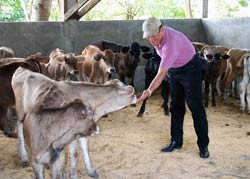
The Rio Lama cattle ranch, located 110 miles northeast of Managua, recently celebrated the birth of its first "organic" calves. Forty-three Nicaraguan cattle ranches, including Rio Lama, now have pastures that have been certified as organic by the International Agriculture and Cattle Organization. The ranch is owned by Daniel Nunez, president of the National Cattle Raising Commission of Nicaragua and a pioneer in promoting organic meat as an excellent market opportunity for Nicaraguan ranchers.
More and more consumers have begun to prefer the quality and reduced fat content of meat from cattle fed on natural grasses and grains, free of pesticides and synthetic hormonal additives. Worldwide, organic meat could generate up to $5 billion a year with demand growing at an annual rate of 20 percent. And with its million hectares of pastureland that in many cases is already pesticide-free, Nicaragua is well-positioned to enter this market.
USAID is funding a program to help Nicaraguan cattle ranchers improve quality and increase their ability to compete in world markets. Since the program began, nearly 14,000 hectares of pastureland and 8,000 head of cattle have been certified as organic. With USAID assistance, ranchers has established links with buyers in the United States, who have been highly impressed with the quality of Nicaraguan beef, and representatives of Nicaragua's cattle industry and Ministry of Agriculture have traveled to the United States to further explore market possibilities.







Comment
Make a general inquiry or suggest an improvement.